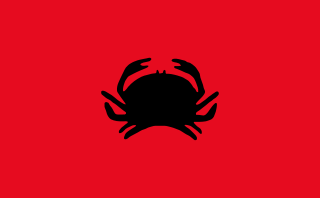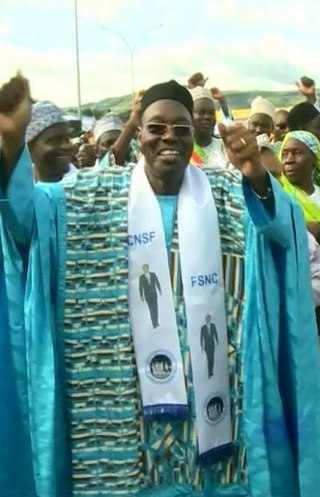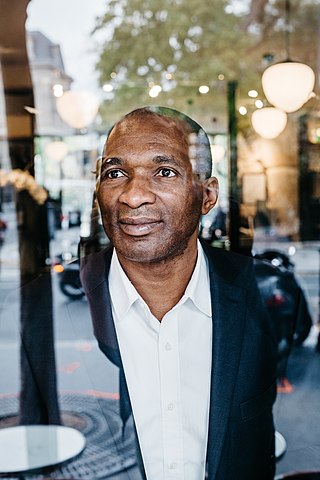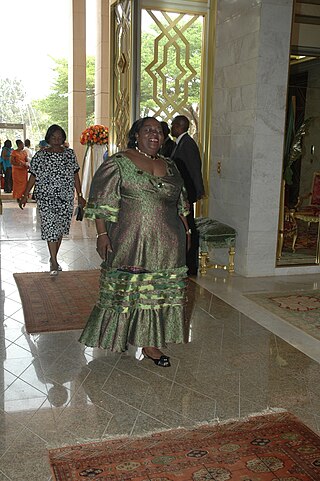Related Research Articles

Paul Biya is a Cameroonian politician who has served as the second president of Cameroon since 1982, having previously been the fifth prime minister of Cameroon from 1975 to 1982. As of 2024, he is the second-longest-ruling president in Africa and the longest consecutively serving current non-royal national leader in the world and the oldest head of state in the world.

The Union of the Peoples of Cameroon is a political party in Cameroon.
Articles related to Cameroon include:

Lesbian, gay, bisexual, and transgender (LGBT) people in Cameroon face severe challenges not experienced by non-LGBTQ residents. Both male and female same-sex sexual activity is illegal in Cameroon and LGBT people face prevalent discrimination among the broader population. As of 2020, Cameroon "currently prosecutes consensual same sex conduct more aggressively than almost any country in the world".

Chantal Biya is the current first lady of Cameroon.

Edgar Alain Mebe Ngo'o is a Cameroonian politician who has occupied multiple positions in the government of Cameroon and has served in the government of Cameroon as Minister of Transport from 2015 to 2017. An important security official, he was Delegate-General for National Security from 2004 to 2009 and Minister-Delegate at the Presidency for Defense from 2009 to 2015.
The mass media in Cameroon includes independent outlets. The nation has only one national newspaper, which is state owned.

Pius Njawé was a Cameroonian journalist and director of Le Messager as well as Le Messager Populi. Arrested over 100 times for his reporting, Njawé won several awards for his work, including the 1991 CPJ International Press Freedom Award and the 1993 Golden Pen of Freedom. In 2000, he was named one of International Press Institute's fifty World Press Freedom Heroes of the previous fifty years. In Njawé's obituary, the New York Times described him as "a symbol of opposition to the autocratic regime of Paul Biya".

Issa Tchiroma Bakary is a Cameroonian politician who served in the government of Cameroon as Minister of Transport from 1992 to 1996 and has been Minister of Communication since 2009. He is the President of the Front for the National Salvation of Cameroon, a minor political party.
Adolphe Moudiki is a Cameroonian political figure who has been Director-General of the National Hydrocarbons Company, the state oil company of Cameroon, since 1993. A long-time associate of President Paul Biya, Moudiki was Minister of Labor from 1987 to 1988, Director of the Civil Cabinet of the Presidency from 1988 to 1989, and Minister of Justice from 1989 to 1991.

Lambo Sandjo Pierre Roger, better known as Lapiro de Mbanga, was a Cameroonian singer who is noted for his 1985 recording of "Pas argent no love" and for being imprisoned in 2008 after criticising Cameroon president Paul Biya in the song "Constitution constipée".

Michel Thierry Atangana is a French citizen of Cameroonian origin who was imprisoned in Yaoundé, Cameroon from 1997 until 2014. International human rights organisations declared him a political prisoner, held for support of potential presidential candidate Titus Edzoa. Atagana was released in 2014 by presidential decree.

The Anglophone problem is a socio-political issue in the modern Republic of Cameroon, rooted in the country's German, British, and French colonial legacies. Anglophone (English-speaking) Cameroonians form a minority population of around 16 percent, mainly from the Northwest and Southwest regions that formerly constituted the Southern Cameroons, part of the former British Cameroon colonies. These Anglophone regions were formerly controlled by Britain as a mandate of the League of Nations, and then as a United Nations trust territory. During the Foumban Conference of 1961, territories with different colonial legacies were finally united into one state.

Presidential elections were held in Cameroon on 7 October 2018.
Sisiku Julius Ayuk Tabe is an Ambazonian separatist leader from Ewelle village in Manyu division, and is the disputed first president of the unrecognized Federal Republic of Ambazonia. In January 2018 he was extradited from Nigeria to Cameroon, where he has been incarcerated ever since.

Françoise Foning was a Cameroonian businessperson and politician for the Cameroon People's Democratic Movement (CPDM). She began a career in business at age 12, opening a restaurant before entering into the tourism, transportation, food, medical and education sectors. Foning became president of CPDM's women's division in 1992 and was appointed the party's leader in Douala and the national committee five years later. In 2002, she was elected deputy mayor of Douala II and began serving in the National Assembly that same year. Foning led the African Network and Cameroonian Businesswomen and consulted The World Bank, the African Development Bank along with several international agencies. She was founding president of the Association of Cameroonian Businesswomen and the NGO World Female Company Managers. A street in Douala was named in her memory.
René Philombé, pen name of Philippe Louis Ombedé, born in the city of Ngaoundere, was a Cameroonian writer, journalist, poet, novelist, and playwright who mostly wrote in French. He was one of the founders of the Association of Cameroonian Poets and Writers (APEC) of which he was the secretary for 20 years. He received the Mottart Prize from the Académie Française and the Fonlon-Nichols prize from the African Literature Association.
Pascal Monkam was a Cameroonian businessman. He notably owned the hotel chain La Falaise and was the father of 16 children.

The Hôtel de Ville is a municipal building in Besançon, Doubs, eastern France, standing on Place du 8-Septembre. It was designated a monument historique by the French government in 1912.
References
- ↑ SEUMO, Hugues (2020-01-23). "Décès de Bertrand Zephirin Teyou, l'homme qui « déshabilla » la Première dame du Cameroun :: CAMEROON". camer.be (in French). Retrieved 2020-02-04.
- 1 2 3 4 5 "CAMEROON: Author jailed for insulting President's wife". International PEN. 25 March 2011. Archived from the original on 23 April 2011. Retrieved 21 April 2011.
- 1 2 3 4 5 6 "Urgent Action:CAMEROONIAN WRITER HELD IN HARSH CONDITIONS". Amnesty International. 12 April 2011. Retrieved 21 April 2011.
- ↑ Théodore Tchopa (8 March 2011). "L'état déclinant de Bertrand Téyou". Le Jour. Archived from the original on 2011-03-13. Retrieved 21 April 2011.
- ↑ Dr. Peter Vakunta (15 March 2011). "S.O.S Bertrand Teyou!". Up Station Mountain Club. Retrieved 21 April 2011.
- 1 2 "Cameroun: L'écrivain Bertrand Teyou Sort De Prison". camerpress.net. 2 May 2011. Archived from the original on 1 December 2011. Retrieved 5 May 2011.
- ↑ "Cameroon: Author Jailed for Insult Released". Writers in Prison Committee, International PEN. 9 May 2011. Retrieved 10 May 2011.
- ↑ "Besançon : émotion après l'incendie de l'hôtel de ville". France 3 Bourgogne-Franche-Comté. June 26, 2015.
- ↑ "Besançon : l'incendiaire présumé toujours en garde à vue, un deuxième homme interpellé". www.estrepublicain.fr.
- ↑ "Incendie de Besançon : le suspect avait menacé de "tout faire brûler" il y a plusieurs jours • macommune.info". www.macommune.info.
- ↑ "Mairie incendiée: Bertrand Teyou condamné à cinq ans de prison". Cameroun 24.net. 27 September 2015. Retrieved 18 November 2024.